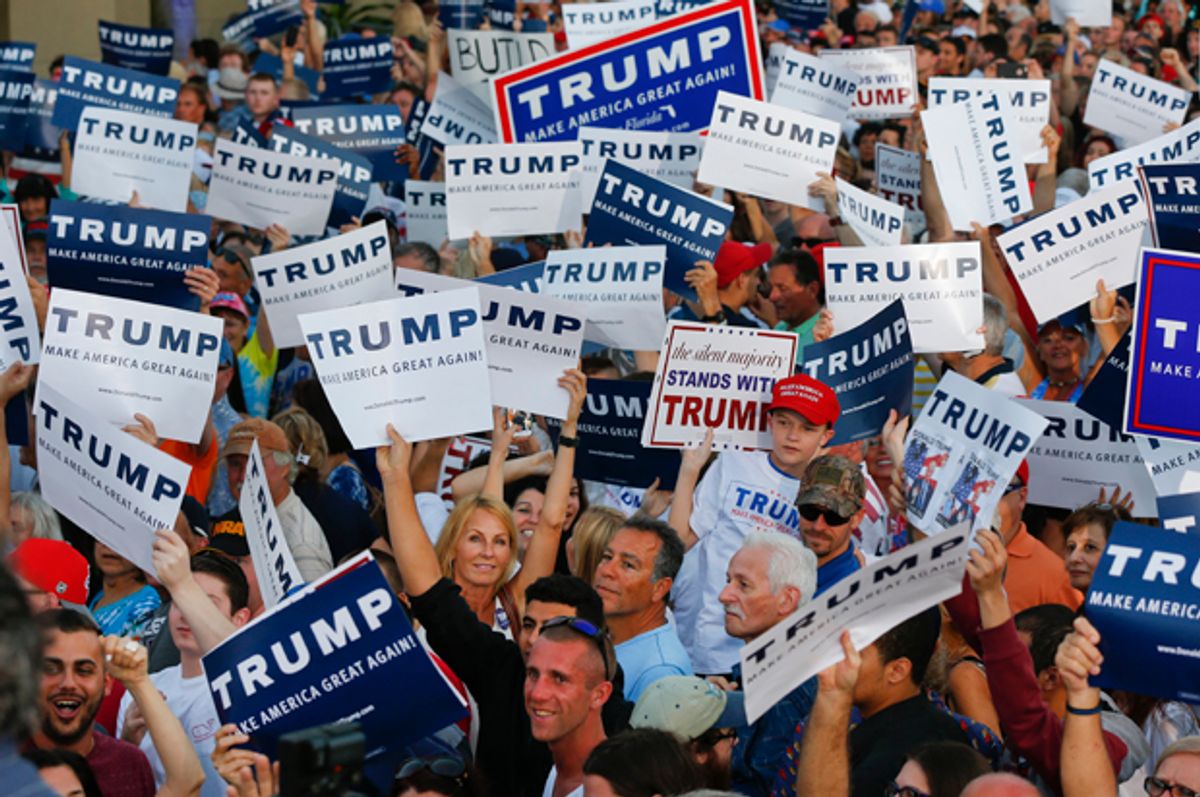Over the past few weeks, it has become increasingly clear that Donald Trump is a threat to domestic tranquility. Throughout the country, people have gathered at Trump rallies and elsewhere to protest the Republican frontrunner and his divisive rhetoric, and many of these protesters have ultimately been dealt with violently, whether sucker punched by unhinged Trump supporters or pepper-sprayed by New York’s finest. Trump’s inflammatory comments about various ethnic and religious groups, along with his advocacy of violence against protesters, has convinced about half of Americans, according to a recent Huffington Post/YouGov poll, that his campaign “exhibits fascist undertones” (only 30 percent disagreed).
And the possibility of a Trump presidency isn’t just alarming Americans; according to the research firm The Economist Intelligence Unit (a sister organization to the neoliberal Economist magazine)
The researchers, like the majority of pundits, feel confident that Trump will not become President of the United States. (Of course, the majority of pundits also felt confident that Trump would already be back to his reality TV career by now.) If favorability ratings are anything to go by, this is probably true — Trump’s ratings are, in a word, horrific. According to the HuffPost Pollster average, 62 percent of Americans have an unfavorable view of the billionaire, compared to just 33 percent favorable. These ratings alone make a Trump victory in November seem unlikely, and EIU researchers conclude that, barring an unlikely event, such as “a terrorist attack on U.S. soil or a sudden economic downturn,” Trump will lose to the presumed Democratic candidate, Hillary Clinton.
This may be so, but it would be unwise to underestimate Trump’s populist appeal to disaffected Americans, along with Hillary Clinton’s natural aptitude for repelling these same kind of voters. (Bernie Sanders is a decent man who decided not to attack Clinton for her emails and went relatively easy on her Wall Street ties — don’t expect Trump to take this high road.) Clinton is the quintessential politician, while Trump is the anti-politician, and right now, many Americans would vote for a professional wrestler over a Washington insider.
Still, even with widespread anti-establishment feelings, there’s a good chance that Trump’s chauvinism will be more repellent to the majority of Americans than Clinton’s neoliberal careerism. And the election could ultimately be decided by those who vote against a certain candidate. (Many conservatives will probably hold their nose and vote against Clinton, while many progressives will similarly vote against Trump.)
Keeping The Donald far away from the White House would help preserve America’s fragile reputation and result in a collective sigh of relief around the world. But don’t expect things to just settle down once the bloviating carnival barker goes back to firing washed up celebrities. Because Trump is only half of the equation in “Trumpism.” And he’s the less terrifying half. Yes, Trump is a crude and obnoxious demagogue; but he’s also a pandering bullshit artist who doesn’t believe in half of what he says.
Consider some of his more controversial proposals: Does anyone really believe that he would get into a trade war with Mexico over a wall, or try to ban an entire religious group from entering the country? Ben Carson more or less exposed Trump earlier this month when he said that the frontrunner had privately reassured him that he didn’t really believe “some of the more outlandish things that he’s said.” (Of course, Carson considers evolution to be “outlandish,” so who knows what that means.) Trump is saying these things to get votes from a Republican base that he knows is xenophobic and irrationally fearful of Muslims and foreigners. While Trump may be grossly ill-informed when it comes to the actual issues, he knows his supporters better than anyone.
And his more enthusiastic supporters are the real threat to America’s future. Trump may not mean half of what he says, but his words have real and increasingly violent consequences. When he says Mexican immigrants are rapists and criminals, or that Islam hates America, people around the country take it as gospel — and the increasing animosity and bitterness that Trump has inspired with his rhetoric will only intensify if he is defeated. Trump may not be an actual fascist, but he is blissfully leading the American right down the road of authoritarianism.

Shares